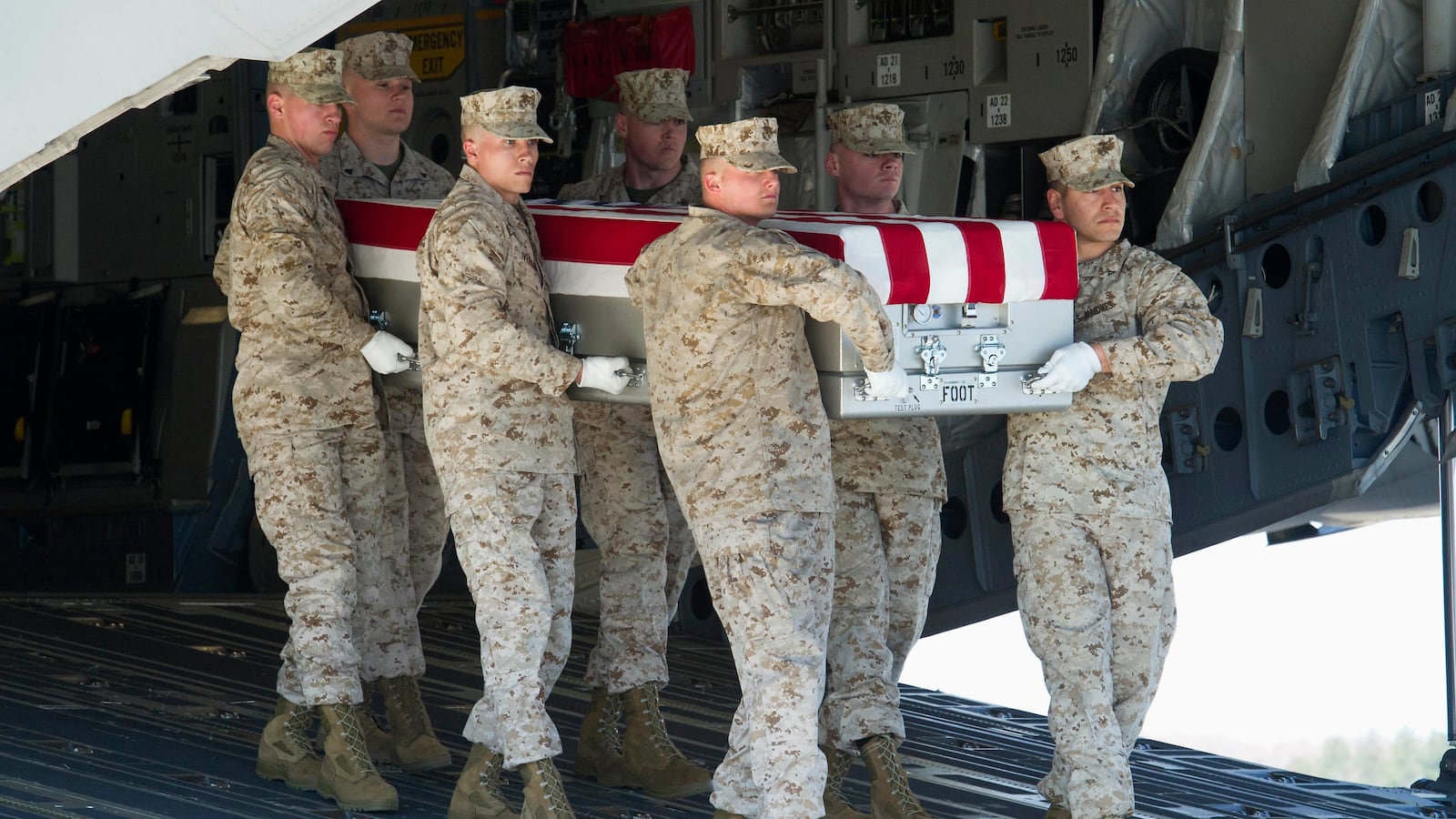The local Iraqi troops had fled the base, retreating into the mountains. That’s why the U.S. military dispatched 200 Marines to a remote outpost in northern Iraq—leading to the death of a Marine just hours later.
The Iraqis had decided the location was too dangerous to stay in, three defense officials told The Daily Beast. The arrival of the Marines, U.S. officials hoped, would give the Iraqis the backbone to fight.
The Iraqis, members of that nation’s 15th Division, had arrived at the base near the city of Makhmour six weeks earlier with great fanfare, greeted by the Iraqi Minister of Defense. Almost immediately, they began retreating from the base amid a barrage of ISIS strikes. Four Iraqi troops at the base were reportedly killed this month by ISIS strikes.
By the time Staff Sgt. Louis Cardin and roughly 200 fellow members of the 26th Marine Expeditionary Unit arrived nearly three weeks ago, all that remained at the base were Iraqi headquarters units that had built infrastructure needed to protect themselves.
The rest of the forces “tactically dispersed,” realizing the base was too dangerous, one defense official explained to The Daily Beast. “They dispersed into the mountains out of an abundance of caution.”
Once the Iraqis refused to make a move on ISIS, the U.S. quickly decided to deploy the Marines alongside the Iraqi forces. The U.S. move to dispatch its Marines to the temporary outpost, known as a fire base, had been made only a month ago.

The Marines were tasked to move onto the fire base and secure the Iraqi forces assigned to the front lines of the push toward ISIS’s Iraqi capital, Mosul. Working alongside their Iraqi counterparts, the Marines would then push the Iraqis to fight for territory, providing them not just with airstrikes but also with artillery fire.
With much of the rank and file Iraqi troops hiding in the nearby mountains, the mission became more about pushing the local forces to fight. Above else, U.S. military planners hoped the Marine presence would break the Iraqi military logjam to move forward.
On Thursday, the latest approach led to moderate success. Members of the Iraqi division, with help from the Marines, took three villages in Makhmour. The villages were largely abandoned and the total movement forward was less than a mile, but in the push to get the Iraqis to take the lead, the U.S. military considered it a win.
Before the Marines arrived, the Iraqi security forces had never tried to take turf around Makhmour.
“I don’t know if the Iraqis would have launched the attack without that [American] artillery,” a U.S. defense official explained.
But the small victory is far from taking back Mosul, which fell to ISIS control in June 2014 after Iraqi troops walked away from their posts.
Makhmour fell to ISIS hands shortly after Mosul did, in August, 2014. Last August, U.S. officials confirmed ISIS used mustard gas against Kurdish peshmerga forces there, sickening dozens.
Makhmour is now considered the staging area for an Iraqi offensive on Mosul. In fact, officials announced Thursday that the advance around Makhmour was the start of the plan to take back Mosul from ISIS. But the fact that it took 200 Marines to get one of Iraq’s better divisions to move on abandoned villages did not portend well for that upcoming operation.
Moreover, the latest U.S. strategy, which put American troops in increased harm’s way, happened without any public pronouncement of a ramped up U.S. engagement in the war against ISIS. The Pentagon did not announce that the Marines were at the fire base until after Cardin died. All the while ISIS watched the arrival of the troops and artillery units, meaning ISIS knew more about U.S. troops’ movements than the American public did.
Even when public pronouncements are made, they often prove obsolete within days. Just days ago, U.S. military officials said the Marines were in Makhmour as a defensive force. On Thursday, defense officials conceded that they’re part of the offensive push to claim the surrounding villages.
The Marines were deployed to the fire base because they could arrive fastest to back up their Iraqi counterparts. They are supposed to stay just a short while, perhaps as little as a month, when they will be replaced by an Army unit, two officials explained.
The Iraqis hope to turn the base over to Kurdish forces after Mosul falls. But privately, American officials consider that a long-term prospect. Right now, the U.S. simply hopes to build a little momentum off of Thursday’s advances.
U.S. officials were reticent to publicly celebrate the gains in Makhmour not only because of how little progress it marked in the move toward Mosul, but the cost it came at.
Cardin died within days of arriving from an ISIS rocket strike that hit his bunker. He was the second U.S. combat death in the war against the so-called Islamic State.





